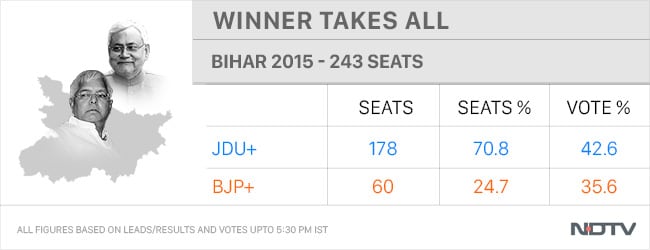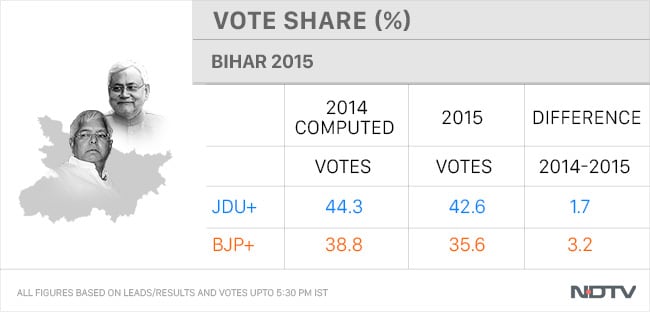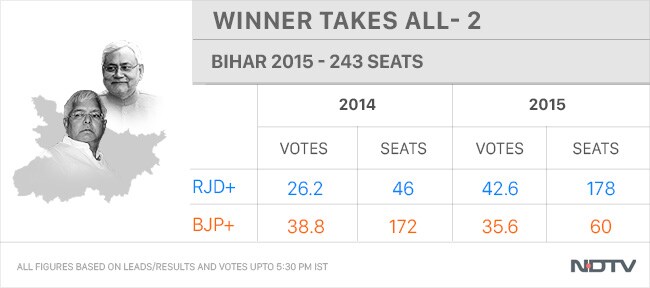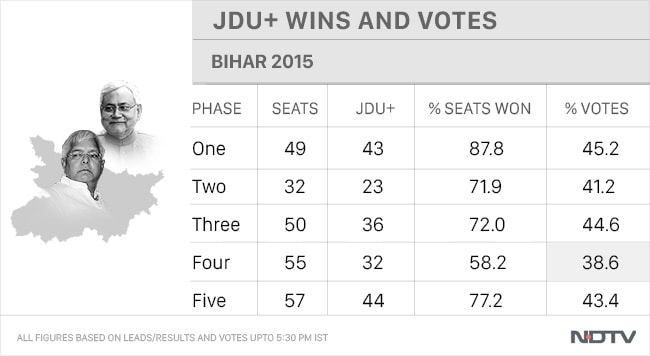The Bihar election result is a huge defeat for the BJP, Prime Minister Narendra Modi and BJP President Amit Shah. From sweeping 172 assembly segments in the 2014 general election, the party has crashed to 61 seats, well below the 94 they got in the last state election five years ago. The BJP ran a full court press campaign, with central ministers parked in Bihar "micromanaging constituencies" as Ravi Shankar Prasad said. The party was reportedly fully backed by ideological parent RSS, who reportedly moved top leaders into the state. So organizationally, they failed to deliver.

If Arvind Kejriwal delivered a blow to the BJP's solar plexus in Delhi, the Nitish and Lalu combo has given a knockout punch. The Grand Alliance has swept every area and ended up with almost three times the seats that the BJP got. And the simple fact is that when there are two alliances fighting each other directly, the election becomes a winner-take-all.
Many questioned whether the JDU and RJD would be able to transfer votes to each other's candidates in this alliance. And they did that almost to the exact percentage. If we computed the votes of both alliances on the basis of the 2014 general election, the Grand Alliance only drops a little bit in its vote share, while the BJP slips 3%.

In a sense, the very arithmetic that carried the BJP to victory in 2014 went against it in 2015 because the opposition was united. So while they lost 3% of the vote, the Grand Alliance's combined vote was 7% above them, enough to reduce them to a paltry 60-odd seats.

The other point is that the JDU vote was spread evenly across, with the JDU only dropping below 40% vote share in the fourth phase, where the BJP has traditionally been strong (in 2014 they won 53 of 55 assembly segments), and even here, Nitish's party managed to capture a majority of the seats.

And it was this arithmetic that brought the JDU and RJD together after the fiasco of 2014. They tested it on the ground in assembly by-elections last year. So they knew it would work if they could share the seats without too much trouble, squash any rebel candidates and hold their respective vote banks together. This they have obviously done. They were also aided by the fact that this election was stretched over a month. It allowed Nitish and Lalu to move from phase to phase and address more than 450 rallies, almost two per constituency.
It wasn't that the BJP did not know what they were up against. But they believed that with organization and a flood of campaigning, they would be able to reverse the Grand Alliance's numerical advantage. The BJP team held more than 900 rallies, led by the Prime Minister.
So this was a defeat for the Prime Minister and Amit Shah, who led the BJP assault in the state and were the posters boys of party, even though neither obviously in the running for Chief Minister. Narendra Modi campaigned extensively throughout the month-long election and in fact increasingly upped the communal language in the campaign. Amit Shah was the brains of the campaign and has to take responsibility for the big flop.
So where did the BJP fail?
It failed to break the vote banks of the Grand Alliance. The people of Bihar did not buy the BJP bogey that Nitish, by tying up with Lalu, would bring back "Jungle Raj" (lawlessness); so after that, the BJP decided to add to the election rhetoric a few salvos of communalism. The Great Indian Cow was first added to the mix, then the accusation that a Great Alliance government would dilute OBC reservations by adding a minority element. In a state that symbolizes the gains of Mandal and enforces that reservation is the key to a better life, this was a subtle but devious message meant to worm its way into the minds of the masses. Amit Shah's comment on crackers in Pakistan and PM Modi's accusation that Nitish protected "terrorists" kept the cauldron bubbling.
But Biharis have supported a Chief Minister who has brought about considerable development, preferring, as Nitish, said a "Bihari over a Bahari". And yet, watching Nitish campaign outside Dharbhanga on Monday, this was clearly a more positive and confident person than last year. He connected better with the crowd and they were much more enthusiastic in their response. He came across as being genuinely liked, which he is. And women, who turned out in large numbers,are traditionally seen as Nitish supporters would have also helped push the Alliance's victory.
As a social scientist told us, the saying in Bihar is "Khao piyo noch ke, vote dalo soch ke (happily grab whatever incentive is offered but vote sensibly)". Obviously the people of Bihar's soch (tactic) was to "nocho" (gouge) the BJP, and that they did decisively.
(Ishwari Bajpai is Senior Advisor at NDTV.)
Disclaimer: The opinions expressed within this article are the personal opinions of the author. The facts and opinions appearing in the article do not reflect the views of NDTV and NDTV does not assume any responsibility or liability for the same.


